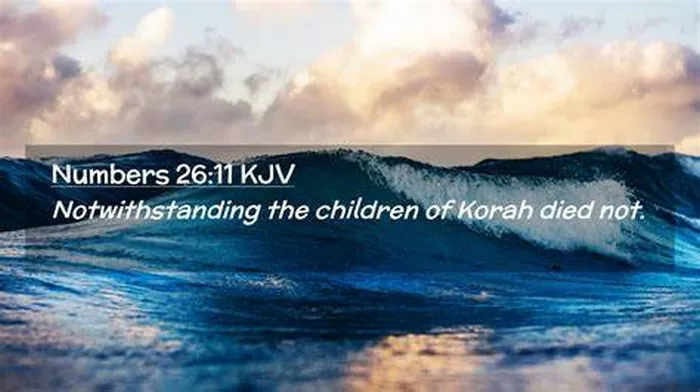Read the Daily Bible Verse – Numbers 26:11 To Strengthen Your Spiritual Journey.
The Context of Numbers 26:11 KJV
The book of Numbers is the fourth book of the Bible and was written by Moses. It records the journey of the Israelites from Mount Sinai to the Promised Land. This book includes laws, historical events, rebellions, and censuses.
Numbers 26 is significant because it records the second census of the Israelites. The first census was taken in Numbers 1, when they had just left Egypt. This second census was done near the end of their journey, just before they entered Canaan.
The purpose of this census was:
To count the new generation. The older generation had died in the wilderness due to their rebellion (Numbers 14:29-30).
To prepare for military service. Only men 20 years and older were counted because they were eligible to fight in battles.
To divide the Promised Land. The land was to be divided according to the size of each tribe.
During this census, the descendants of Korah are mentioned. Korah was an important figure in Israel’s history because of his rebellion against Moses in Numbers 16. However, Numbers 26:11 gives an interesting detail about his family.
Numbers 26:11 (KJV)
The King James Version (KJV) of Numbers 26:11 states:
“Notwithstanding the children of Korah died not.”
This short verse provides a very important message. While Korah was destroyed because of his rebellion, his children survived.
Numbers 26:11 Meaning
To understand Numbers 26:11, we must first understand who Korah was and why his children did not die.
1. Who Was Korah?
Korah was a Levite and a leader in Israel. However, he led a rebellion against Moses and Aaron in Numbers 16. He, along with Dathan and Abiram, challenged Moses’ leadership, saying: “Ye take too much upon you, seeing all the congregation are holy, every one of them, and the Lord is among them: wherefore then lift ye up yourselves above the congregation of the Lord?” (Numbers 16:3 KJV)
This rebellion was not just against Moses, but against God’s authority. As a result, God punished Korah and his followers.
2. What Happened to Korah?
God caused the earth to open and swallow Korah, Dathan, Abiram, and their families. This was a severe judgment from God. Numbers 16:32 states: “And the earth opened her mouth, and swallowed them up, and their houses, and all the men that appertained unto Korah, and all their goods.”
However, Numbers 26:11 tells us that Korah’s children did not die. This means that some of his descendants were spared.
3. Why Did Korah’s Children Survive?
There are several possible reasons why Korah’s children were not killed:
They did not participate in Korah’s rebellion. It is possible that they did not agree with their father’s actions and remained faithful to God.
God showed mercy. Even though He punished Korah, He allowed his lineage to continue.
This shows that God judges individuals based on their own actions, not just their family’s sins.
4. The Later Role of Korah’s Descendants
The descendants of Korah later became important figures in Israel’s worship. They wrote several Psalms in the Bible, including:
Psalm 42: “As the hart panteth after the water brooks, so panteth my soul after thee, O God.”
Psalm 84: “How amiable are thy tabernacles, O Lord of hosts!”
These Psalms show that Korah’s descendants were devoted to God.
This is a powerful reminder that God can redeem a family’s history. Even though Korah rebelled, his descendants became worshippers of God.
Numbers 26:11 Application in Life
Even though Numbers 26:11 is part of a historical record, it contains important lessons for believers today.
1. God Judges Us Individually
Even though Korah rebelled, his children were not automatically punished. This teaches us that:
- God does not judge us based on our family’s sins.
- Each person is responsible for their own choices.
- We must choose to follow God regardless of what our family does.
This is an encouragement to those who come from difficult backgrounds. Your past does not define your future with God.
2. God’s Mercy is Greater Than Our Past
Even though Korah’s name was associated with rebellion, his descendants were later used by God. This shows that:
- God can restore and redeem families.
- Your past mistakes do not have to define you.
- God’s grace is greater than any failure.
No matter what your family history is, God can use you for His purposes.
3. We Must Choose to Follow God
Korah’s sons had a choice:
- They could have joined the rebellion, but they did not.
- Instead, they remained faithful to God.
This shows that we must personally choose to follow God. We cannot rely on our family’s faith—we must develop our own relationship with Him.
4. Worship is a Powerful Way to Honor God
The descendants of Korah became worship leaders and wrote Psalms that are still read today. This teaches us:
- Worship is a powerful way to connect with God.
- God uses broken people for His glory.
- Our legacy can change when we commit ourselves to God.
If you have a difficult past, you can still be used by God. Your story is not over!
Conclusion
Numbers 26:11 may be a short verse, but it has a powerful message. The story of Korah’s descendants reminds us that no matter where we come from, we can be part of God’s plan. Even if our past is broken, God can restore us and use us for His purposes. Let us choose to follow God faithfully, just like Korah’s sons did!
You Might Be Interested In:


